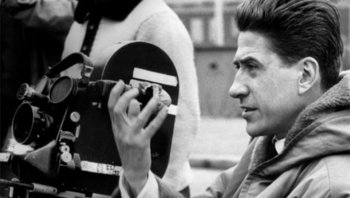« The Devil Strikes at Night | Main | To Sleep so as to Dream »
March 15, 2022
Alain Resnais: Five Short Films

Alain Resnais
Le Chant du Styrene - 1957
Paul Gauguin - 1949
Guernica - 1949
Toute la Memoire du Monde - 1956
Van Gogh - 1948
Icarus Films BD Region A
What links these five shorts is that they were also produced by Pierre Braunberger. It was Braunberger who encouraged the novice filmmaker, then in his early 20s to consider becoming a director, handing several commissioned projects. As a producer, Braunberger's name should be familiar as the person who helped launch the "Nouvelle Vague", financing early short films by Truffaut and Godard. The booklet that comes with the blu-ray features an interview with Braunberger's daughter, Laurence.
Those familiar with Resnais' features from his first decade and half would find it fitting that one of the films here is titled (in English) as All the World's Memories. Unlike the real or imagined memories of the dramatic features, this is a documentary about the National Library of France. Even so, Resnais begins with a visual memory of Citizen Kane before getting down to business. The short opens with a microphone dangling from a boom, dipping down from the top of the frame, similar to the opening shot of the Citizen Kane trailer. This is followed by a series of traveling overhead shots of piles of manuscripts, books crowded on shelves, and an uncountable number of boxes, reminders of the camera taking inventory in Kane's Xanadu. Resnais' playfulness with his subject matter has him remind the viewer that the library not only collects every literary book published in France, but comic books as well with a glance at favorites, "Mandrake the Magician" and "Dick Tracy".
The shorts on impressionist painters Paul Gaugin and Vincent Van Gogh are both biographical portraits using only their respective artwork. Seen almost back to back, what struck me is how the two friends and rivals seemed to influence each others work in the way some of the faces were painted. Van Gogh also won the Academy Award for Best Short Subject in 1950.
The direction of Guernica is co-credited to Robert Hessens, also credited for his writing contributions on Van Gogh. The actual painting is never seen in full, but is presented in fragments, along with other paintings and sculptures by Picasso, while actress Maria Casares reads a poem by Paul Eluard, "The Victory of Guernica".
For those unfamiliar with French, the Le Chant du Styrene is a pun on the word styrene, in English, siren. Having read a couple of his novels, I am assuming this little joke was by the film's writer, Raymond Queueau, most famous for his novel, Zazie. What is suppose to be an industrial documentary on the history of plastic begins with various molded colored utensils springing to life. These look like images from a science-fiction movie, something finally realized with Je t'aime, je t'aime almost a decade later.
Of additional interest here are some of the collaborators to these shorts in addition to Casares and Queneau. Composers include Darius Milhaud, Georges Delarue and Maurice Jarre. Cinematographers include Sacha Vierny and Ghislain Cloquet. Le Chant du Styrene was Resnais' last short before making his feature debut with Hiroshima, Mon Amour. Even though that film coincidentally was released at about the same time as the Nouvelle Vague films first appeared, Resnais was a decade older with over twenty short films completed by that time. The restoration and availability of these five early works is certainly welcomed.
Posted by Peter Nellhaus at March 15, 2022 05:00 AM
